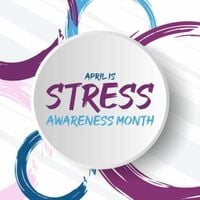As April unfolds, many are reminded that it is Stress Awareness Month, a time dedicated to recognizing the impact of stress on our lives. For women, the pressures of balancing work, family, relationships, and health can create a unique set of challenges that often go unnoticed until they manifest in more serious ways. This month, experts are stepping forward to shed light on these issues and offer practical advice to help manage stress effectively.
Dr. Naomi Torres-Mackie, a Clinical Psychologist at Northwell Lenox Hill Hospital, emphasizes the distinct ways stress can affect women. In her discussion on New York Living, she highlights that stress can show up in various forms, from anxiety and fatigue to physical health issues. "Women often feel the need to juggle multiple roles—caregiver, professional, partner—which can lead to overwhelming feelings of stress," she explains.
Dr. Torres-Mackie advocates for proactive stress management strategies. She suggests that women take the time to identify their stressors and recognize the signs of stress before they escalate. These signs can include irritability, difficulty sleeping, and changes in appetite. "Understanding your body’s signals is crucial in managing stress effectively," she adds.
In addition to Dr. Torres-Mackie's insights, Dr. Katherine Pannel appeared on WLBT’s Living Better with Ambetter to discuss similar themes surrounding stress. She echoes the sentiment that April, being Stress Awareness Month, serves as an important reminder for everyone, particularly women, to assess their mental health and coping mechanisms.
Dr. Pannel offers practical tips for managing stress, including mindfulness exercises, regular physical activity, and maintaining a healthy diet. She emphasizes the importance of self-care, stating, "Taking time for yourself is not selfish; it's necessary for maintaining your mental health." Furthermore, she discusses the importance of seeking professional help when stress becomes overwhelming. "If you find that stress is impacting your daily life significantly, it may be time to reach out for support," she suggests.
Both experts agree that recognizing when stress has become unmanageable is key. Dr. Pannel notes that signs such as persistent sadness, anxiety, or withdrawal from social activities are indicators that professional guidance may be needed. "It’s important to remember that asking for help is a sign of strength, not weakness," she affirms.
As the month progresses, the conversations around stress awareness continue to resonate. With the pressures of modern life, especially for women who often feel the weight of multiple responsibilities, the need for effective stress management strategies has never been more critical.
In summary, as Stress Awareness Month unfolds, women are encouraged to take a step back and evaluate their stress levels. With the guidance of professionals like Dr. Torres-Mackie and Dr. Pannel, there are practical steps that can be taken to alleviate stress and promote better mental health. Whether through mindfulness, seeking professional help, or simply making time for self-care, these strategies can empower women to manage the pressures they face.
Ultimately, recognizing the impact of stress and taking proactive measures can lead to healthier, more balanced lives. As we continue through April, let’s remember the importance of prioritizing mental health and well-being.


